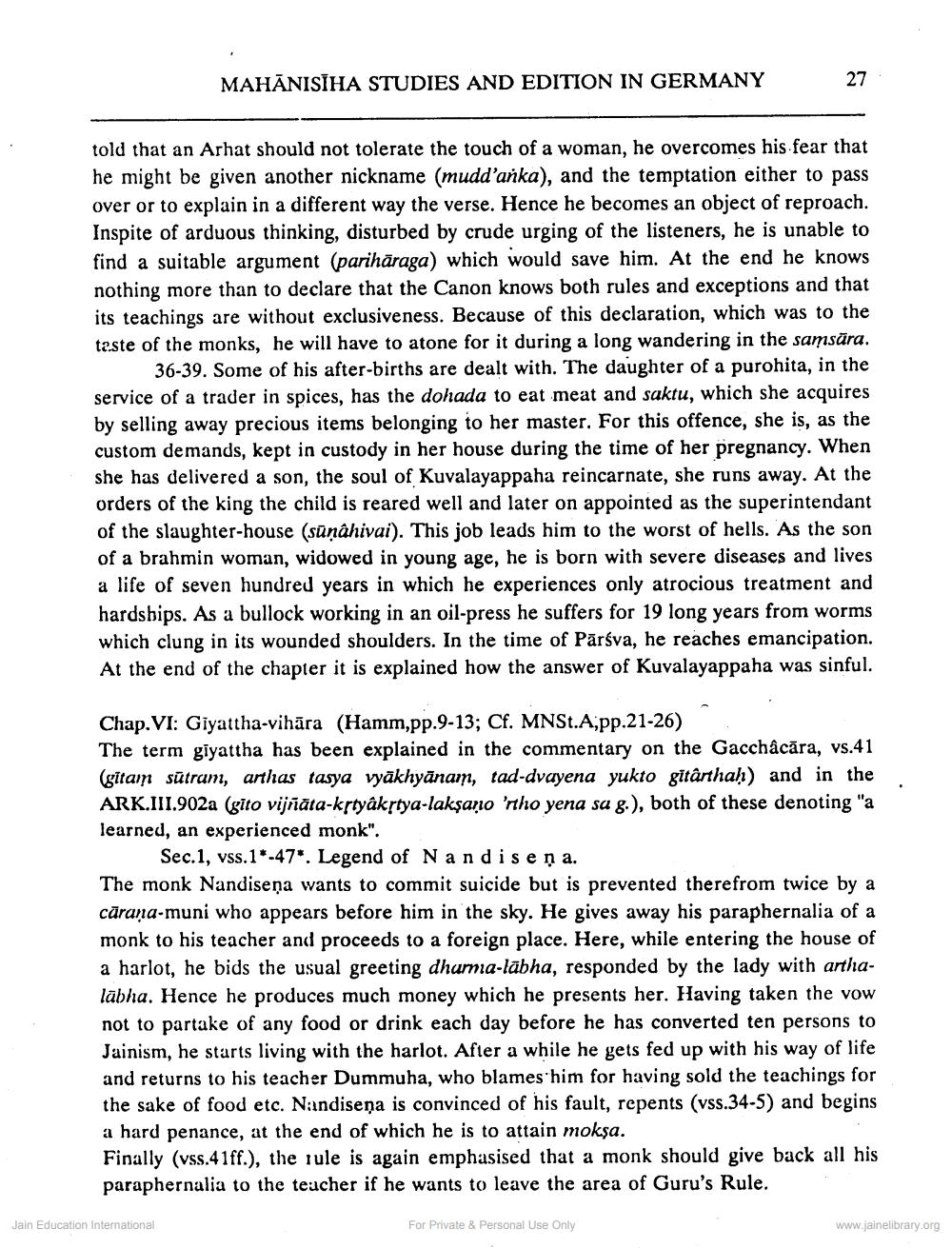________________
MAHĀNISĪHA STUDIES AND EDITION IN GERMANY
27
told that an Arhat should not tolerate the touch of a woman, he overcomes his fear that he might be given another nickname (mudd'ańka), and the temptation either to pass over or to explain in a different way the verse. Hence he becomes an object of reproach. Inspite of arduous thinking, disturbed by crude urging of the listeners, he is unable to find a suitable argument (parihāraga) which would save him. At the end he knows nothing more than to declare that the Canon knows both rules and exceptions and that its teachings are without exclusiveness. Because of this declaration, which was to the taste of the monks, he will have to atone for it during a long wandering in the samsāra.
36-39. Some of his after-births are dealt with. The daughter of a purohita, in the service of a trader in spices, has the dohada to eat meat and saktu, which she acquires by selling away precious items belonging to her master. For this offence, she is, as the custom demands, kept in custody in her house during the time of her pregnancy. When she has delivered a son, the soul of Kuvalayappaha reincarnate, she runs away. At the orders of the king the child is reared well and later on appointed as the superintendant of the slaughter-house (sūņâhivai). This job leads him to the worst of hells. As the son of a brahmin woman, widowed in young age, he is born with severe diseases and lives a life of seven hundred years in which he experiences only atrocious treatment and hardships. As a bullock working in an oil-press he suffers for 19 long years from worms which clung in its wounded shoulders. In the time of Pārsva, he reaches emancipation. At the end of the chapter it is explained how the answer of Kuvalayappaha was sinful.
Chap.VI: Giyattha-vihāra (Hamm,pp.9-13; Cf. MNSt.Ajpp.21-26) The term giyattha has been explained in the commentary on the Gacchâcāra, vs.41 (gitam sūtram, arthas tasya vyākhyānam, tad-dvayena yukto gitârthah) and in the ARK.III.902a (gito vijñāta-krtyâkrtya-lakşaņo 'nho yena sa g.), both of these denoting "a learned, an experienced monk".
Sec.1, vss.1*-47*. Legend of Nandis eņ a. The monk Nandisena wants to commit suicide but is prevented therefrom twice by a cāraṇa-muni who appears before him in the sky. He gives away his paraphernalia of a monk to his teacher and proceeds to a foreign place. Here, while entering the house of a harlot, he bids the usual greeting dharma-lābha, responded by the lady with arthaläbha. Hence he produces much money which he presents her. Having taken the vow not to partake of any food or drink each day before he has converted ten persons to Jainism, he starts living with the harlot. After a while he gets fed up with his way of life and returns to his teacher Dummuha, who blames him for having sold the teachings for the sake of food etc. Nandiseņa is convinced of his fault, repents (vss.34-5) and begins a hard penance, at the end of which he is to attain moksa. Finally (vss.41ff.), the rule is again emphasised that a monk should give back all his paraphernalia to the teacher if he wants to leave the area of Guru's Rule.
Jain Education International
For Private & Personal Use Only
www.jainelibrary.org




